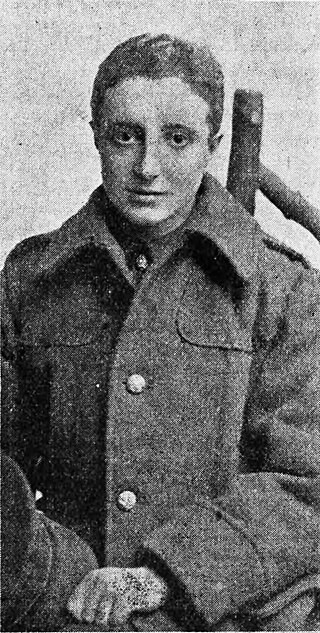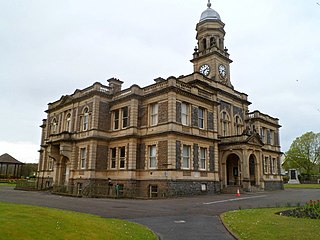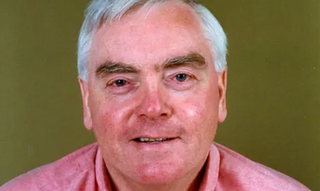Related Research Articles

Saunders Lewis was a Welsh politician, poet, dramatist, Medievalist, and literary critic. Born into a Welsh-speaking ministerial family in Greater Liverpool, Lewis studied in a public school growing up. He rediscovered the importance of both his heritage language and cultural roots while serving as a junior officer in the British Army during the trenches of the First World War. As a vocal supporter of Welsh nationalism, Lewis believed, however, that heritage language revival, cultural nationalism and the decolonisation of Welsh-language literature, the dramatic arts, and culture needed to precede Welsh devolution or political independence. If the excessive Anglophilia and colonial mentality traditionally known as Dic Siôn Dafydd was never challenged or defeated, Lewis predicted in 1918, "the Welsh Parliament would [only] be an enlarged County Council."
Plaid Cymru is a centre-left to left-wing, Welsh nationalist political party in Wales, committed to Welsh independence from the United Kingdom. It campaigns on a platform of social democracy and civic nationalism. The party is a strong supporter of the European Union and is a member of the European Free Alliance (EFA). The party holds 4 of 32 Welsh seats in the UK Parliament, 12 of 60 seats in the Senedd, and 202 of 1,231 principal local authority councillors. Plaid was formed in 1925 under the name Plaid Genedlaethol Cymru and Gwynfor Evans won the first Westminster seat for the party at the 1966 Carmarthen by-election.

The Welsh Language Society is a direct action pressure group in Wales campaigning for the right of Welsh people to use the Welsh language in every aspect of their lives. The chair of the Welsh Language Society since October 2023 is Joseff Gnagbo.

Llanelli is a market town and community in Carmarthenshire and the preserved county of Dyfed, Wales. It is located on the Loughor estuary and is also the largest town in the county of Carmarthenshire.

Gwynfor Richard Evans was a Welsh politician, lawyer and author. He was President of the Welsh political party Plaid Cymru for thirty-six years and was the first member of Parliament to represent it at Westminster, which he did twice, from 1966 to 1970, and again from 1974 to 1979.

Welsh nationalism emphasises and celebrates the distinctiveness of Welsh culture and Wales as a nation or country. Welsh nationalism may also include calls for further autonomy or self-determination, which includes Welsh devolution, meaning increased powers for the Senedd, or full Welsh independence.
Robert Maynard Jones, generally known as Bobi Jones, was a Welsh Christian academic and one of the most prolific writers in the history of the Welsh language. A versatile master of poetry, fictional prose and criticism, he was born in Cardiff in 1929, educated at the University of Wales, Cardiff and University College Dublin. Jones held the chair in Welsh language at Aberystwyth from 1980 until his retirement. He died on 22 November 2017.
This article is about the particular significance of the year 1962 to Wales and its people.

Llangennech ( ) is a village and community in the area of Llanelli, Carmarthenshire, Wales, which covers an area of 1,222 hectares (4.72 sq mi).

Plaid Cymru originated in 1925 after a meeting held at that year's National Eisteddfod in Pwllheli, Caernarfonshire. Representatives from two Welsh nationalist groups founded the previous year, Byddin Ymreolwyr Cymru and Y Mudiad Cymreig, agreed to meet and discuss the need for a "Welsh party". The party was founded as Plaid Genedlaethol Cymru, the National Party of Wales, and attracted members from the left, right and centre of the political spectrum, including both monarchists and republicans. Its principal aims include the promotion of the Welsh language and the political independence of the Welsh nation.
Tynged yr Iaith was a radio lecture delivered in Welsh by Saunders Lewis on 13 February 1962. Reaction to it brought about a major change in the politics of Wales. Historian John Davies has said that the lecture was "the catalyst" for the formation of Cymdeithas yr Iaith Gymraeg, and the start of a period of direct-action agitation to enhance the status of the Welsh language. Its direct effect on the formation of Cymdeithas yr Iaith Gymraeg is described in a history of that society. It has been said that "of all the memorable phrases coined in the twentieth century none has greater resonance for the Welsh speaker than Tynged yr Iaith. .. which still haunts or inspires champions of the native tongue on the cusp of the new millennium". It had the unintended effect of establishing language agitation as a movement separate from the mainstream of nationalist politics. The burgeoning effects from the initial stimulus of Tynged yr Iaith were listed by Gwyn Williams:
The history of the Welsh language spans over 1400 years, encompassing the stages of the language known as Primitive Welsh, Old Welsh, Middle Welsh, and Modern Welsh.
Gwenno Teifi is a Welsh language activist from Llanfihangel-ar-Arth, Wales. In February 2006 she became the first member of Cymdeithas yr Iaith Gymraeg to serve a jail sentence for a language protest in 11 years.
House prices increased in Wales during the Housing market crisis in the United Kingdom (2008). There has been political debate that this has contributed to a decline in the number of speakers of the Welsh language.

Hywel Teifi Edwards was a Welsh academic and historian, a prominent Welsh nationalist, a broadcaster and an author in the Welsh language. He was the father of former BBC journalist Huw Edwards.
Dr Meirion Pennar was a Welsh poet and academic, who translated two works of Welsh language literature.

Bryn Fôn is a Welsh actor and singer-songwriter. He also became the first ever artist to play live on BBC Radio Cymru in 1977.

Gareth Jamie Bevan is a Welsh language campaigner from Merthyr Tydfil, Wales and a prominent member of Cymdeithas yr Iaith Gymraeg. Bevan refused to pay fines and costs to Merthyr Tydfil Magistrate's Court for breaking into Conservative Party offices in north Cardiff the day before a visit from David Cameron in a demonstration against cuts to S4C.
Edward Glynne Millward, also known as Tedi Millward, was a Welsh scholar and nationalist politician.
Undeb Cymru Fydd was a Welsh patriotic and cultural society. It was founded in 1941 when Undeb Cenedlaethol y Cymdeithasau Cymreig and Pwyllgor Amddiffyn Diwylliant Cymru merged to form a new organization with the aim of promoting Welsh culture and the Welsh language and to be the focus and medium of cooperation for that purpose. The new organization took the name of the earlier patriotic movement Cymru Fydd, which was established in 1886.
References
- 1 2 3 Stephens, Meic (29 September 2012). "Eileen Beasley: Welsh language campaigner". The Independent. Retrieved 11 August 2017.
- 1 2 "Tributes paid to Welsh language activist Eileen Beasley, who died age 91". WalesOnline. 13 August 2012. Retrieved 13 August 2012.
- ↑ "BBC News – Eileen Beasley: Welsh language campaigner dies". BBC.co.uk. 4 August 2012. Retrieved 13 August 2012.
- ↑ "Anrhydeddu 'Rosa Parks Cymru'". BBC News. Retrieved 13 August 2012.
- ↑ "Beasley Family BP Unveil". Llanelli Community Heritage. Archived from the original on 13 April 2015. Retrieved 13 April 2015.
- ↑ "Saunders Lewis: Fate of the Language" . Retrieved 14 August 2012.
- ↑ Jones, Alun R.; Thomas, Gwyn (1983). Presenting Saunders Lewis (2nd ed.). University of Wales Press. p. 140. ISBN 0-7083-0852-X.